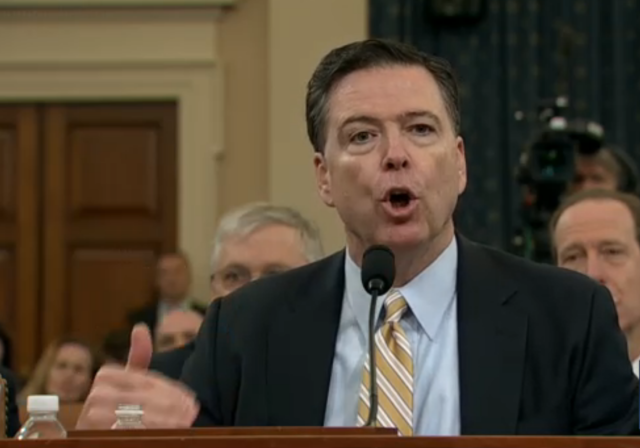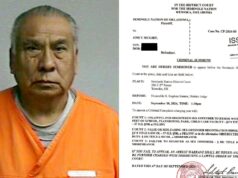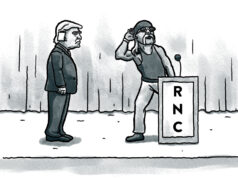A day before the U.S. House Intelligence Committee began hearing testimony from national intelligence officials about Russian interference in the 2016 election, the Washington Post published an article detailing five things to watch.
Although the bipartisan House Intelligence Committee‘s hearing coincided with the United Nations’ International Day of Happiness, those seeking answers to WaPo’s questions may come away more glum than giddy.
FBI director James Comey and Director of the National Security Agency Adm. Michael Rogers began fielding questions at 10 a.m. Eastern time Monday in Washington, D.C. You can watch the entire hearing here. The following are the Washington Post’s five questions as examined after Monday’s hearing.
1. Can Republicans stop the bleeding? Can Democrats unearth a smoking gun?
Answering the first half of this two-part question fell to HIC chairman Rep. Devin Nunes (R-California) and his dozen GOP cohorts at the dais. For the latter half, ranking HIC member Rep. Adam Schiff (D-California) led the charge for the eight other minority members.
Both received answers in the negative.
The smoking gun Democrats seek would pin officials within President Donald Trump’s camp directly to Russian authorities actively involved in tilting the 2016 vote in Trump’s favor. During pointed lines of questioning that mentioned specific individuals, however, Comey repeatedly invoked his inability to comment on classified information regarding an ongoing investigation.
At the same time, Comey’s muzzled responses failed to polish up the Republicans’ image. In particular, Rep. Terri Sewell (D-Alabama) painted a rather damning portrait of Michael Flynn, former director of the Defense Intelligence Agency.
In her questioning, Sewell brought up Flynn’s relationship to the kremlin-backed propaganda news site Russia Today, his reported acceptance of $35,000 from the organization (a direct violation of the emoluments clause), as well as texts, phone calls and in-person meetings Flynn had with the Russian ambassador in December.
“Isn’t the American public right to be concerned about Mr. Flynn’s contact with Russians?” she asked.
Still, Comey could neither confirm nor deny queries about specific individuals or their level of involvement.
The bleeding continues.
2. Will Comey admit to an investigation?
Observers didn’t have to wait long for the answer to this one. Comey’s opening remarks to the HIC included an admission that:
… the FBI, as part of our counterintelligence mission, is investigating the Russian government’s efforts to interfere in the 2016 presidential election and that includes investigating the nature of any links between individuals associated with the Trump campaign and the Russian government and whether there was any coordination between the campaign and Russia’s efforts.
Until Monday, Comey had never officially admitted that the FBI and Justice Department are actively looking into potential Russia-Trump-election ties.
3. Is it just about wiretapping — or could there be other surveillance involved?
Citing information released by the Justice Department on Friday, both Schiff and Nunes on Sunday morning had already refuted Trump’s claims via Twitter about former-President Barack Obama’s administration putting wiretaps in Trump Tower.
On Monday, Comey concurred.
“I have no information that supports those tweets,” Comey said.
As testimony continued, WaPo’s “other surveillance” hypotheses wound up being affirmed. Committee members spent a great deal of time grilling Comey and Rogers on the nature of “unmasking” classified people, places and things as well as the legal ramifications of “indirect surveillance.”
(In effect, the FBI would not have to directly wiretap someone to collect intel on that person. Instead, surveillance of a different-but-somehow-connected person could yield unintentional, indirect intel.)
4. Will Republicans cross the White House?
Quite the opposite. As if taking their cues from Trump’s tweets earlier that morning, the Republican line of questioning throughout the hearing shifted from one of election interference and wiretaps to one of leaks.
The real story that Congress, the FBI and all others should be looking into is the leaking of Classified information. Must find leaker now!
— Donald J. Trump (@realDonaldTrump) March 20, 2017
Rep. Peter King (R-New York) toed that line.
“I’ve never seen such a sustained period of leaks,” he said.
5. Where do we go from here?
Plenty of questions remain unanswered regarding the investigation into Russia’s interference in the 2016 election. Comey appears unlikely to reveal anything until his department’s investigation is closed.
As of now, the evidence supporting Trump affiliations with Russian agents provocateurs is circumstantial.
In the court of public opinion, however, many people need not wait for an official conclusion before making up their own minds.
Background
The U.S. intelligence committee comprises 17 organizations. In a Jan. 6 report, all 17 unanimously concluded:
Russian President Vladimir Putin ordered an influence campaign in 2016 aimed at the US presidential election. Russia’s goals were to undermine public faith in the US democratic process, denigrate Secretary Clinton, and harm her electability and potential presidency.
Despite this conclusion, former director of national intelligence James Clapper denied election-related interference on the part of the Russians, based on lack of evidence.
For a more in-depth recap, CNN’s timeline of the potential Trump-Russia campaign connection is nothing if not comprehensive. It begins just over a year ago. Then-U.S. Sen. Jeff Sessions had endorsed then-candidate Trump. It ends on Sunday, with the Senate Intelligence Committee asking Trump adviser Roger Stone to preserve any election-related documents he may have, as such information may be pertinent to the ongoing Russian investigation.






















